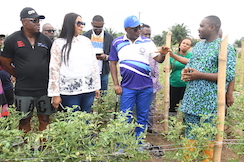Admin I Saturday, April 06, 2024
NDDC moves to empower young farmers for food security, job creation

PORT HARCOURT, Nigeria – The Niger Delta Development Commission, NDDC, has pledged to support small-holder farmers to grow their operations and become training centers for youth, as part of its plan on advancing food security and promoting youth employment.
Speaking during an inspection visit to some farms in Akwa Ibom State, the NDDC Executive Director of Projects, Sir Victor Antai, stressed the Commission’s commitment to leveraging on the agricultural potential of the Niger Delta region and promoting the shift from traditional to mechanised farming methods.
The Executive Director, who was accompanied by the NDDC Director, Agriculture and Fisheries, Mrs. Winifred Madume and the Director of Commercial and Industrial Development, Dr. Godwin Nosiri, expressed delight at the enthusiasm shown by young farmers in boosting food production.
Antai said that the Commission would purchase modern farming equipment, such as tractors, to boost its agricultural initiatives, notably the Holistic Opportunities, Projects, and Engagement, HOPE, project.
He stated: “The Project HOPE’ initiative seeks to engage youths of the region by creating employment opportunities for them, especially in agriculture.”
“In fulfilling the Renewed Hope Agenda of the President Bola Tinubu, the NDDC introduced the youth empowerment programme, which has agriculture as one of its key components.”
Antai recalled that the NDDC was collaborating with the Rice Farmers Association of Nigeria, RIFAN, as part of its efforts to ensure food security in the Niger Delta region.
He said: “Following the directive of our Managing Director, Dr Samuel Ogbuku, we have incorporated regular project inspections in our routine activities for effective delivery on the NDDC mandate.”
The Executive Director observed that the Niger Delta region was blessed with the right ingredients for growing various crops and vegetables, stating: “The Niger Delta region because of the arable wetlands, rainfalls and other favourable ecological factors is in a better position to plant various crops and vegetables at least four times within a farming season.”
“We are trying to move away from the oil economy and the sector which can accommodate our youths in large number is the agricultural sector. We also want to move from subsistent agriculture to mechanized farming in order to harness all the opportunities that the Niger Delta region has to offer.”
The resource person for Project HOPE, Ambassador Blessing Fubara, noted that second phase of the youth empowerment programme would focus on commercial agriculture, information and communication technology, as well as assisting youths in the creative industry.
Fubara added that the first strategy of the project was designed to create jobs for the youths through the development of agro-allied industries in the nine Niger Delta states according to their potentials and resources.
Speaking at his farm in Ikot Ebom Itam in Itu Local Government Area of Akwa Ibom State, the Chairman of the Commercial Farmers Association in the state, Mr. Aniebet Antia, identified lack of capital as the major constraint to commercial farming, noting that with proper funding, small-holder farmers would contribute substantially to food production in the country.
The NDDC team also inspected the Asuakak Farms at Ididep Usuk in Ibiono Ibom, Local Government Area, managed by a young farmer, Mr. Kufre Joseph, who had a variety of crops, including cassava, Cabbage, cucumber, carrots, tomatoes and pepper.

